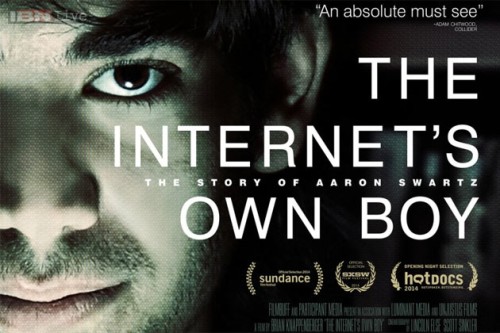
Written by Rachael Johnson.
Directed by Brian Knappenberger, The Internet’s Own Boy (2014) is an involving and profoundly moving documentary about Internet icon Aaron Swartz. Swartz was not only an innovative and influential programmer, he was also a deeply committed Free Speech and Open Access advocate. In late 2010 and early 2011, Swartz downloaded academic documents from JSTOR at MIT. Arrested in January 2011, he was charged with wire fraud and theft of information. Facing up to 35 years in prison and a $1 million fine, he took his own life in his New York apartment on Jan. 11, 2013. He was 26 years old.
Examining both his private and public life, The Internet’s Own Boy intermixes home movies, stills, news footage, and interviews with friends and relatives. Home videos of Swartz as a child illustrate his intellectual precocity while family members recall his love of learning. At the age of 12, he created a Wikipedia-like information site before Wikipedia called info-org. The documentary comprehensively chronicles both his Internet and activist careers. Swartz programmed for Creative Commons, helped develop RSS and co-founded Reddit. When Reddit was bought by Conde Nast in 2006, the programmer relocated to California. But he literally recoiled from office life, and abandoned start-up culture. Peter Eckersley, a former roommate of Swartz and technological projects director at Electronic Frontier Foundation, tells us, “He was totally unexcited about starting businesses and making money.” Swartz was inspired by the example of World Wide Web inventor, Tim Berners-Lee, who wanted his creation to be used by all. He could have been like any other self-serving member of the 1 percent but he chose another path.

Swartz soon became a leading Open Access and Free Speech activist. He saw the Internet as an instrument of freedom and enlightenment, and his profoundly moral and generous vision is evident from his personal blog, excerpts of which are featured in the documentary: “I work for ideas and learn from people. I don’t like excluding people…I want to make the world a better place.” Swartz co-founded Demand Progress in 2010, an advocacy group that successfully fought the Stop Online Piracy Act (SOPA). That public information and records should be out of reach of the public struck him an absurd injustice. In 2008, he downloaded electronic federal court records from the expensive public access service PACER. (Although investigated by the FBI, Swartz was not charged.) Expressing unease with social and economic inequality, he became increasingly politically engaged. In 2009, he co-founded the Progressive Change Campaign Committee. Aaron Swartz offered–and still offers–another way of thinking and being.
Although The Internet’s Own Boy does not give a gender-aware reading of Swartz, it is clear that the programmer and activist embodied a certain egalitarian masculinity. Although Swartz possessed attributes that have been traditionally associated with masculinity–such as single-mindedness and risk-taking–he neither personified nor espoused ideals of dominant masculinity. Unlike the ruinous gambling of the bankers who wrecked so much havoc on the world’s economy during the financial crisis, his risk-taking sought to serve the greater good. Swartz simply did not want to be a prized exemplar of corporate masculinity. He seemed uninterested in exercising power, and he did not exhibit the customary misogyny of his industry. Indeed he challenged institutions of power and wealth, asking why they possess so much control over human knowledge. Men like Swartz expand modern definitions of masculinity. The other way of thinking and being that he offered transcends gender, race, age, and sexuality, and he remains an inspirational figure for all.

Critics may argue that the documentary offers a romanticized account of its subject. It sides with Swartz, that’s true, but the argument presented is utterly persuasive. Isn’t it, in fact, self-evident? How can anyone be locked away for 35 years for downloading academic documents? There is, also, no denying that Swartz is a romantic figure. He was an attractive, young man who wanted nothing more than to share knowledge. The Internet’s Own Boy chronicles this sad, shameful story of prosecutorial zeal with insight and compassion. It both angers, and moves the viewer. The prosecutors’ lack of imagination and humanity simply takes your breath away. If there is a modern-day American martyr, it is Aaron Swartz.
The Internet’s Own Boy is a passionate, intelligent tribute to the tragically short but brilliant life of the programmer and activist. The documentary successfully captures Swartz’s spirit and rightly underscores his visionary genius and socio-cultural importance. Recounting both his days of triumph and despair, it acknowledges his vulnerabilities and fears as well as his drive and passion. The story of Aaron Swartz is one of the most important of the millenium and it is encouraging that The Internet’s Own Boy is on this year’s Oscar shortlist. It’s a documentary about our time and we all need to see it.

